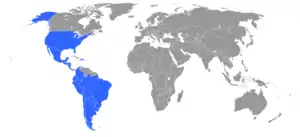Buenos Aires Convention
The Buenos Aires Convention (Third Pan-American Convention) is an international copyright treaty signed in Buenos Aires, Argentina, on 11 August 1910, providing mutual recognition of copyrights where the work carries a notice containing a statement of reservation of rights (Art. 3). This was commonly done with the phrase "All rights reserved" (Spanish: Todos los derechos reservados; Portuguese: Todos os direitos reservados) next to the copyright notice. This implementation varied as US law only required the author and year of publishing. Copyright protection under the convention is granted for the shorter of the terms of the protecting country and the source country of the work ("rule of the shorter term", Arts. 6, 7). The rather vague nature of the requirement for a statement of reservation led to the development of longer and more legalistic wordings, which have persisted despite the developments in international copyright law.
| Convention on Literary and Artistic Copyright | |
|---|---|
 Signatories to the Buenos Aires Convention | |
| Type | Multilateral |
| Signed | 11 August 1910 |
| Location | Buenos Aires, Argentina |
| Parties | 18 |
| Depositary | Ministry of Foreign Affairs of the Argentine Republic |
| Languages | Spanish, English, Portuguese and French |
| Full text | |
The convention is specifically retained by the Universal Copyright Convention (UCC) of 6 September 1952 (Art. 18 Geneva Act), with the most recent formulation taking precedence in case of conflict. As the Buenos Aires Convention was not modified, the presence of a simple copyright notice was sufficient to ensure mutual recognition of copyright between countries which became parties to the UCC (which only Honduras never did). As of 23 August 2000, all parties to the Buenos Aires Convention are also parties to the Berne Convention for the Protection of Literary and Artistic Works, which provides for mutual recognition of copyright without any formalities (Art. 5.2 Berne).
The Buenos Aires Convention became a "special agreement" in the terms of Article 20 of the Berne Convention. It remains in force, notably for determining the source country of a work and hence the term of protection which is applicable in countries which apply the "rule of the shorter term": when a work is simultaneously published in a Convention State and a non-Convention State, the Convention State will be taken to be the source country regardless of the term of protection in the non-Convention State.
| Country | Buenos Aires Convention | UCC | Berne | |
|---|---|---|---|---|
| Argentina | 19 April 1950 | 13 February 1958 | 10 June 1967 | |
| Bolivia | 15 May 1914 | 22 March 1990 | 4 November 1993 | |
| Brazil | 31 August 1915 | 13 January 1960 | 9 February 1922 | |
| Chile | 14 June 1955 | 16 September 1955 | 5 June 1970 | |
| Colombia | 23 December 1936 | 18 June 1976 | 7 March 1988 | |
| Costa Rica | 30 November 1916 | 16 September 1955 | 10 June 1978 | |
| Dominican Republic | 31 October 1912 | 8 May 1983 | 24 December 1997 | |
| Ecuador | 27 April 1914 | 5 June 1957 | 9 October 1991 | |
| Guatemala | 28 March 1913 | 28 October 1964 | 11 January 1997 | |
| Haiti | 27 November 1919 | 16 September 1955 | 11 January 1996 | |
| Honduras | 27 April 1914 | — | 25 January 1990 | |
| Mexico | 24 April 1964 | 12 May 1957 | 11 June 1967 | |
| Nicaragua | 15 December 1913 | 16 August 1961 | 23 August 2000 | |
| Panama | 25 November 1913 | 17 October 1962 | 8 June 1996 | |
| Paraguay | 20 September 1917 | 11 March 1962 | 2 January 1992 | |
| Peru | 30 April 1920 | 16 October 1963 | 20 August 1988 | |
| United States | 1 August 1911 | 16 September 1955 | 1 March 1989 | |
| Uruguay | 11 May 1919 | 12 April 1993 | 10 July 1967 | |
Sources: U.S. Copyright Office, UNESCO, WIPO
References
- ^ Geneva Act of the Universal Copyright Convention, done at Geneva, 1952-09-06.
- ^ Berne Convention for the Protection of Literary and Artistic Works Archived 11 September 2012 at the Wayback Machine (Paris Act), as amended on 1979-09-28.
- ^ The United States has never applied the rule of the shorter term: all copyright works are protected for the normal U.S. term of copyright.
- ^ The United States deposited its Instruments of Ratification with the Government of Argentina on 1911-05-01, and hence the treaty came into force with respect to the other parties three months after that date (Art. 16). The treaty was not proclaimed in the United States until 1914-07-13.
- ^ "International Copyright Relations of the United States", U.S. Copyright Office Circular No. 38a, August 2003.
- ^ Parties to the Geneva Act of the Universal Copyright Convention as of 2000-01-01: the dates given in the document are dates of ratification, not dates of coming into force. The Geneva Act came into force on 1955-09-16 for the first twelve to have ratified (which included four non-members of the Berne Union as required by Art. 9.1), or three months after ratification for other countries.
- ^ Parties to the Berne Convention for the Protection of Literary and Artistic Works as of 2006-05-30.